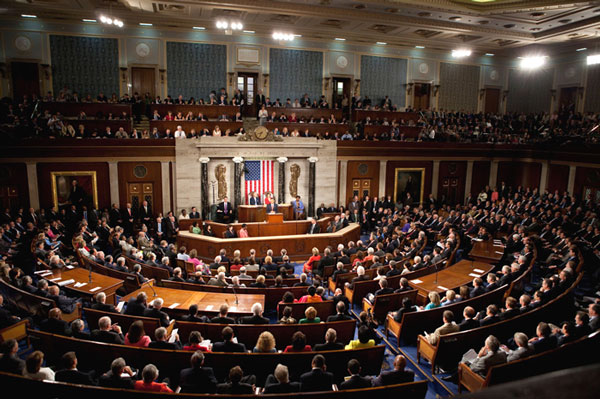
Washington, United States | AFP | US Republicans ditched decades of tradition Thursday by changing Senate rules to ensure Neil Gorsuch’s confirmation to the Supreme Court, bypassing the first-ever successful opposition blockade of a high-court nominee.
President Donald Trump’s pick, embraced by conservatives but opposed by most Democrats, failed to receive the 60 votes necessary to end debate on his nomination in the 100-seat Senate.
In response, Senate Majority Leader Mitch McConnell moved to change the rules so that a simple majority suffices to advance Gorsuch — and all subsequent Supreme Court nominees — from the debate to a confirmation vote.
The contentious maneuver — known as the “nuclear option” — was approved 52 to 48 along party lines in the Republican-controlled Senate, landing like a political earthquake in a chamber already straining to adhere to its traditions of comity, consensus and bipartisanship.
“Our Democrat colleagues have done something today that is unprecedented in the history of the Senate,” McConnell said in seeking to justify his potentially far-reaching step.
“Unfortunately, it has brought us to this point. We need to restore the norms and traditions of the Senate and get past this unprecedented partisan filibuster.”
From this point on, any effort in the Senate to hold up a presidential nominee can be overcome with a simple majority.
That is what happened minutes after the rule change, with the Senate voting again to advance Gorsuch’s nomination — this time successfully, by a vote of 55 to 45.
A final vote on Gorsuch is now set for Friday, and his confirmation is all but assured. The White House said Gorsuch will be sworn in as the newest Supreme Court justice as early as Monday.
The tit-for-tat maneuvers — filibuster followed by nuclear option — are almost certain to change the tone and temper of the Senate, and lead to more fringe high-court justices being approved on either political side.
– Undoing ‘guardrails’ of Democracy –
Top Senate Democrat Chuck Schumer pointed the finger at Republicans, but said he took “no solace” in blaming his political rivals because the consequences of the change will be so dramatic.
“The nuclear option means the end of a long history of consensus on Supreme Court nominations,” he said ahead of the vote, describing the Senate’s ability to use the 60-vote threshold as “the guardrail of our democracy.”
“The answer is not to undo the guardrails, the rules. It’s to steer back to the middle, and get a more mainstream candidate.”
Most Democrats remain livid with Republican leaders for refusing to even give a hearing to Merrick Garland, the judge nominated last year by Barack Obama to fill the Supreme Court seat of conservative justice Antonin Scalia, who died in February 2016.
McConnell and his fellow Republicans expressed no interest in Trump finding a new nominee in the face of Democratic resistance.
But several Republicans did voice concerns about changing the rules of the Senate, seen as more deliberative and less impulsive than the House of Representatives.
“It breaks my heart that we’re here,” said Senator Lindsey Graham, noting the trend over the past 15 years of increasingly partisan votes on court nominees.
“I don’t know what to do other than change the rules to have some sense of fairness.”
McConnell and company forged ahead, infuriated by Democrats’ insistence on filibustering what Republicans consider a mainstream Supreme Court nominee.
– ‘Regret’ –
It was Democrats who first used the nuclear option, back in 2013 when they controlled Congress and felt Republicans were obstructing too many of Obama’s lower court nominations.
They lowered the threshold from 60 votes to 51 votes for all nominees except Supreme Court justices. Four years later, it was Republicans who finally stripped away that final filibuster — although the 60-vote threshold for advancing legislation remains.
“I anticipate that many of my colleagues will come to regret the decisions and actions taken today,” said Senator Chris Coons.
The Delaware Democrat spoken openly about seeking — and failing to reach — a bipartisan deal that would have preserved Senate rules and ensured that more centrist, consensus candidates made it on to the bench.
“But Senators of both sides told me we could not find a durable compromise because we do not trust each other anymore,” he said.
 The Independent Uganda: You get the Truth we Pay the Price
The Independent Uganda: You get the Truth we Pay the Price


